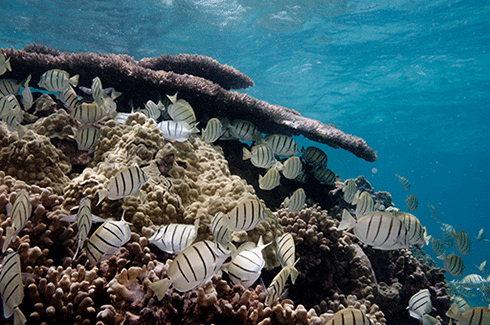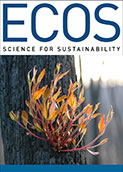
|
Published: 18 August 2014
Acidification rates higher in coral reefs than open oceans
The rate of acidification in coral reef ecosystems is more than three times faster than in the open ocean, according to recent research published in Geophysical Research Letters by Australian biogeochemists.

|
|
The pH of a coral reef is influenced by runoff and terrestrial inputs. Credit:
USFWS CC BY 2.0
|
Ocean acidification, or the lowering of the ocean pH due to anthropogenic inputs of carbon dioxide, has been well documented in the open ocean. However, this research reviewed studies done in coral reefs since the 1960s before concluding that the rate of acidification in coral reef ecosystems was more than three times faster than in the open ocean.
The researchers – Southern Cross University’s Dr Tyler Cyronak, Associate Professor Isaac Santos, Associate Professor Kai Schulz, and Professor Bradley Eyre – developed a model based on previous work at Heron Island in the Great Barrier Reef to determine the potential causes of this rapid increase in carbon dioxide.
‘Our model demonstrated that small changes in the biogeochemistry, or the way coral reefs breathe carbon dioxide, could be to blame,’ said Dr Cyronak, the research project leader.
‘During the day, coral reefs take up carbon dioxide because photosynthesis is dominant, and at night they release carbon dioxide through respiration. Small changes to this natural daily cycle can have a big impact on the average acidity of coral reef waters.’
According to Professor Bradley Eyre, the findings from this study are globally important because coral reefs are under a lot of pressure from climate change.
‘Ocean acidification in particular is expected to result in reef loss, which may now be worse than previously expected,’ he said.
The biogeochemists argue that increased inputs of organic material and nutrients could be responsible for the disparity.
‘More organic material can change the ratio of respiration to photosynthesis,’ said Associate Professor Kai Schulz.
‘Coral reefs are generally balanced, but if respiration increases it can have a big effect on the average carbon dioxide levels of a reef.’
The news is not all bad for coral reefs, with the scientists offering some hope.
‘Generally ocean acidification is thought of as a global problem. However, if the pH of a coral reef can be controlled by reducing runoff and terrestrial inputs there may be solutions to help offset the global problem of ocean acidification, or at least the increased threat, on a regional level,’ said Dr Cyronak.
Source: Southern Cross University



